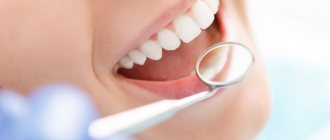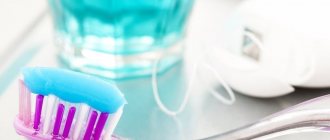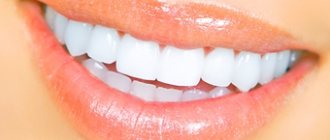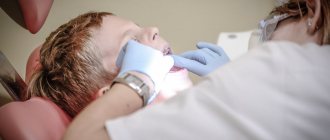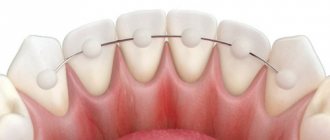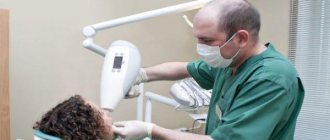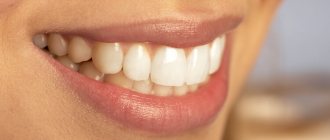What are the causes of the numerous problems with teeth and gums that expectant mothers suffer from? How can they maintain a healthy smile, and can they be treated by a dentist during pregnancy? We answer the most important questions about pregnancy and teeth.
Dentists at appointments often hear the same story from patients: “Doctor, my teeth started to fall out during (after) pregnancy.” Many women have the feeling that during intrauterine development the child “takes” calcium from the mother’s teeth, causing caries and gum disease.
In fact, this is a myth that has no scientific evidence. The calcium reserves necessary for the baby's development are not replenished by the mother's teeth. Why then do dental problems worsen during pregnancy?
What happens to teeth and gums during pregnancy?
Most often during this period, women complain of an exacerbation of diseases such as caries, gingivitis, and periodontitis. Each of them can lead to tooth loss if not treated promptly.
Toxicosis can also become a catalyst for carious processes. Nausea and vomiting, as well as changes in eating habits (large amounts of carbohydrates) cause disruption of the acid-base balance in the oral cavity, demineralization of teeth and the development of caries. If you do not sanitize the oral cavity before pregnancy, even minor carious lesions can turn into large lesions within nine months.
During pregnancy, hormonal levels (estrogen and progesterone levels) change and immunity decreases, which can lead to disruption of the gums' response to plaque formation. By leaving ordinary plaque unattended and untreated, you risk causing it to degenerate into tartar, which can damage the entire tooth.
Plaque also causes the development of gingivitis, an infection of the oral mucosa that causes swelling, redness, and bleeding of the gums. Due to altered hormonal levels, any inflammatory reaction in the body of the expectant mother is more violent, which is why the disease is otherwise called “hypertrophic gingivitis” or “gingivitis of pregnant women.” If it is not cured, it can develop into periodontitis, which means that gradual resorption or loss of bone tissue, suppuration of gum pockets and tooth mobility will be added to the listed symptoms.
However, it is still not worth linking a sharp deterioration in oral health with pregnancy. If you maintained proper oral hygiene before pregnancy, regularly attended preventive examinations and had professional cleanings every six months, then all of the problems listed above will most likely not affect you.
It’s another matter if you have never removed dental plaque and have not treated caries. Even if they practically didn’t bother you before pregnancy, during pregnancy the previously “acquired” problems will most likely worsen.
Let's talk about how pregnancy affects dental health with dentist-therapist Lyudmila Lukyanchenko.
The pregnancy period is a wonderful month in anticipation of the baby. But it is worth considering that at the same time the mother’s body is under a serious load. It is the teeth that can suffer from various tests.
When is it necessary to see a dentist, what procedures are not prohibited during pregnancy?
Let's figure out what is causing the rapid formation of dental caries in expectant mothers.
1. Hormonal levels change. The level of hormones (estrogen, progesterone), which have immunosuppressive properties, changes - this leads to an increase in the amount of plaque on the teeth. Changes also occur in the mucous membrane of the oral cavity - it becomes easily vulnerable and bleeds even from a light touch (the so-called gingivitis of pregnant women).
2. During pregnancy, the composition and quantity of saliva changes, and its protective function decreases. Due to a lack of calcium in pregnant women, the surface of the teeth becomes vulnerable to bacteria “responsible” for the development of caries.
3. An increase in appetite often leads to an increase in the amount of carbohydrates consumed, which disrupts the acid-base balance in the oral cavity, and this in turn contributes to the accumulation of soft plaque, leading to demineralization of tooth enamel and the occurrence of caries.
Can dental problems in the expectant mother affect the baby’s health?
An infection that occurs due to inflammation of the gums or diseased teeth can spread from the carious cavity throughout the body through the bloodstream, and this does not have the best effect on the course of pregnancy and the development of the fetus.
In addition, toothache is a psycho-traumatic factor, especially during pregnancy.
When should you visit the dentist and what procedures are allowed during pregnancy?
It is best to resolve all dental issues and undergo professional cleaning before planning a pregnancy, in this way it will be possible to minimize possible risks.
But if a different situation arises and treatment is required during pregnancy, then any dental interventions should be avoided during the first trimester, because it is during this period that the fetus is at the stage of active development.
The ideal time for routine visits to the dentist is the second trimester (from 14 to 28 weeks). The full range of necessary surgical and therapeutic measures is allowed, including the use of painkillers.
During the third trimester, the risk to the fetus is minimal, but due to the volume of the fetus and its pressure on the blood vessels, treatment can cause significant discomfort and it is better to refrain from interventions during this period.
If there are urgent indications, treatment is carried out in any trimester of pregnancy.
Dental care during pregnancy:
1. Try to reduce the amount of sweets and fast carbohydrates you eat.
2. Replace soda with water or low-fat milk; instead of fruit juice, it is better to eat fruit.
3. Brush your teeth twice a day with fluoride paste (the optimal amount of fluoride in adult toothpaste is 1500 ppm).
4. Remember about dental floss: it should be used twice a day, every day - this is required for more thorough cleaning of the spaces between the teeth.
5. To improve hygiene, you can use plaque indicators at home.
Can a mother’s “dental” diseases affect the baby’s health?
Sick teeth and inflamed gums are a source of infection for the entire body. From the carious cavity, microbes can penetrate through the root canal into the blood and even provoke disturbances in the functioning of internal organs (heart, kidneys, etc.).
In addition, recent studies suggest that premature birth and the birth of low-weight children may be associated, among other things, with gum disease - an infection in the mother’s body can adversely affect the child’s health. Therefore, preventive dental examinations are extremely important for the health of both the child and the mother.
Safety first
Perhaps you have been putting off visiting the dentist for a long time, and now a tooth that was not filled in time is beginning to make itself felt, but you are more concerned about how anesthesia may affect the development of the fetus. There is no need to worry: according to researchers, dental treatment using local anesthesia with modern safe drugs can also be performed on pregnant women. Unfortunately, too many expectant mothers avoid dental treatment because of a perceived threat. Don't join their ranks.
During pregnancy, the risk of tooth decay increases, and there are several reasons for this. Women begin to consume more carbohydrates; due to toxicosis, the acidity of the oral environment increases; against the background of hormonal changes, gum bleeding increases. It is paradoxical that pregnant women are in no hurry to consult a dentist with these problems, when it is his help that they so need.
When to visit the dentist and what procedures are allowed?
The best option is to solve all dental problems and have professional cleaning done in advance, before planning a pregnancy, in order to minimize possible risks. But if you have started the situation, and dental treatment during pregnancy cannot be avoided, then you should remember the precautions.
Thus, in the first and third trimesters, you should limit yourself to only urgently necessary procedures, be sure to consult with your gynecologist about anesthesia or taking medications. Based on these recommendations, your dentist should determine the need for hygienic teeth cleaning and therapeutic treatment in the first trimester.
The safest time for dental treatment is the second trimester (14 to 26 weeks). At this stage, all manipulations can be carried out - taking precautions, of course. However, if possible, it is better to avoid introducing pharmaceutical drugs into a woman's body.
During pregnancy, it is highly recommended not to undergo procedures such as implantation and prosthetics, resort to surgical treatment, or remove tartar. This is due to the use of anesthesia.
Women are allowed to treat caries during pregnancy and periodontal diseases, inflammatory processes in the gums and teeth, tooth extraction (non-surgical), and installation of braces (if there is no tooth mobility).
Why might an expectant mother refuse to cleanse?
In addition to medical contraindications, there may be a number of personal reasons why it is recommended to avoid in-office teeth cleaning during pregnancy.
The first factor is purely psychological, but it is also the most important. If a woman is nervous when visiting a dental clinic, then there is no need to carry out cleaning unless indicated (only according to indications). It is impossible to worry the expectant mother, much less make her very nervous and experience discomfort. There are cases when you cannot do without the help of a doctor - with gingivitis, which pregnant women often suffer from, acute pain, caries, etc. Professional cleaning can usually be delayed for several months.
The second important factor is also largely related to the psychological state. If teeth are highly sensitive, even men and women who are not expecting a child are often advised to avoid ultrasonic cleaning. It can make teeth even more sensitive, which will lead to additional stress for the expectant mother.
Is it possible to have x-rays and anesthesia during pregnancy?
Many experts, including those from the American Dental Association, note that if you can avoid X-rays during pregnancy, then it is better to play it safe and refuse this type of diagnosis. The same applies to anesthesia.
However, if x-rays and anesthesia are still necessary, you should resort to them in the second trimester, because in the first trimester, the formation of the baby’s vital organs occurs, and in the third, it is already physically difficult for a woman to perform any procedures. When choosing an anesthetic drug, your dentist should choose anesthetics with minimal amounts of epinephrine.
As for x-rays, the type of examination officially approved for pregnant women and nursing mothers is diagnostics using a dental computed tomograph. The radiation exposure in this case is minimal. In addition, the device gives the doctor the opportunity to accurately identify problems at the earliest stages of diseases, which helps to avoid diagnostic errors and complications.
Advertising
Contraindications to teeth cleaning in the clinic
Some doctors list pregnancy as a contraindication, but this applies to a specific number of procedures. Dentists at the Planet of Childhood clinic in Moscow select a cleaning method for expectant mothers that cannot harm their health and the health of their future children.
However, if a pregnant woman has the following diseases, then professional cleaning is prohibited:
- epilepsy;
- venereal diseases;
- infections that are transmitted by airborne droplets;
- diabetes;
- allergies to certain substances and drugs;
- asthma;
- hepatitis;
- HIV;
- Chronical bronchitis;
- any cancer;
- presence of a pacemaker implant.
Before allowing or prohibiting a pregnant woman from having professional teeth cleaning, the doctor must conduct an examination. So, you definitely need to take a blood test: even if you do not have diabetes, but your sugar levels are elevated, it is better to refuse cleansing.
Cleaning for pregnant women never implies subsequent teeth whitening, since this will have to be postponed until the moment when the woman not only gives birth, but also stops breastfeeding.
How to care for your teeth during pregnancy?
- Limit your consumption of carbohydrates and sweets - they provoke tooth decay.
- Replace sodas with water or low-fat milk and fruit juices with fruit.
- Brush your teeth with fluoride toothpaste and floss twice a day. Special pastes with sage, chamomile, and mint, which have an anti-inflammatory effect, are also effective.
- For frequent attacks of nausea and vomiting, chewing gum without sugar or with xylitol will help you, as well as rinsing your mouth with a soda solution after an attack (1 teaspoon of soda per glass of water). This will neutralize the negative effects of acids on enamel.
So, so that diseases of the teeth and gums do not overshadow the most important period in a woman’s life, you should prepare for it in advance - go to the dentist, get rid of caries and inflammatory gum diseases, and also regularly undergo professional hygienic cleaning.
Nutrition and vitamin intake to maintain dental health
The need for vitamins during pregnancy increases by approximately 1.5–2 times, which is due to the intensification of metabolic processes in the mother’s body and the use of some vitamins to meet the metabolic needs of the growing fetus. Mineral metabolism also changes: calcium and phosphorus in the pregnant woman’s body begins to pass to the fetus. As a result, a woman’s blood becomes deficient in them, which affects the condition of the hard tissues of the tooth [2].
Vitamin preparations can cause unwanted effects, and some of them have a potential teratogenic effect, so they should be selected together with a doctor [3]. For prevention, vitamins are used in doses close to the daily intake norms [1, 3].
It is important to reconsider the content of the diet - limit the consumption of sweet foods, giving preference to healthy foods rich in proteins, vitamins and minerals. It is worth increasing the amount of dairy products - sources of calcium, as well as eating more fresh vegetables and fruits [3].

